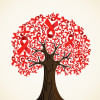Like a phoenix: living with HIV for 32 years

It was the hottest day of summer Europe ever experienced in the the last 40 years and I was eagerly waiting to meet Mr. Haerry David from Switzerland, co-author for www.hivrestrictions.org. We were there to talk about decriminalisation and restrictions on people living with HIV in many countries. Haerry David has been living with the human immunodeficiency virus (HIV) infection for the last 32 years. He is a survivor living with HIV for the highest number of years, ever encountered by me. Surprisingly, I found Bangladesh besides the Middle East, China and Malaysia, who deport HIV infected people as soon as they are detected during their stay, and puts restriction on any kind of visit for those who are already detected. So I decided to share David's story to know more about HIV with breaking barriers and building bridges in his own words.
"The result was positive. It took me six months to make up my mind and I went to the hospital for screening", said Mr Haerry. "Two to three years, maybe more, maybe less", my physician told me about my life expectancy. They wanted to give me antiretroviral medication with very bad side effects. I walked away from the premises with many uncertainties.
Later on, I focused on my career and until I fell very sick in 1996. I was losing hope as I lost 30 kgs rapidly, having Kaposi sarcoma along with atypical tuberculosis. In 1996 specific treatment for HIV arrived which worked really well for me. I managed my way facing so many side effects and today I have an advanced regime of Integrase inhibitors, Nevirapine and Abacavir.
After my diagnosis was made positive, I worked for 10 years like a normal person but quit my job in 1996. I worked while I already had HIV and at the time had an entry restriction to the USA and I had to go there twice a year as a Swiss businessman. I was very nervous while I was receiving treatments. I started repacking my treatment as vitamins to get customs clearance. When I could not work anymore, I said to my friends that we should establish a database of the countries where we are not allowed to travel. That is when a database was established. So far we have touched a few landmarks. The most prominent government that repealed the restrictions was USA, Taiwan, South Korea and Singapore.
We believe the person with or without HIV should have access to the health system in the country where s/he lives, like anybody else who has any kind of health issue. If you have diabetes and you go abroad, you are treated abroad. So people with HIV should be treated the same. As the world is fighting against HIV and striving to eliminate HIV by the year 2030, we all should take efforts in eliminating the stigmas and treat people with HIV with equal rights just like other people.
The writer is an Assistant Registrar at the Kurmitola General Hospital, Dhaka.

 For all latest news, follow The Daily Star's Google News channel.
For all latest news, follow The Daily Star's Google News channel. 





Comments